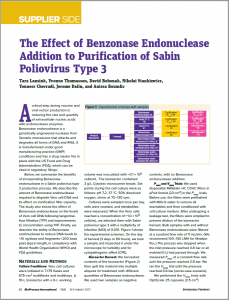- Sponsored Content
- Filtration
- Separation/Purification
The Effect of Benzonase Endonuclease Addition to Purification of Sabin Poliovirus Type 3The Effect of Benzonase Endonuclease Addition to Purification of Sabin Poliovirus Type 3
Sponsored by Merck-Millipore
 During production of vaccines and viral vectors, the size and quantity of extracellular nucleic acids must be reduced using endonuclease enzymes. Merck/MilliporeSigma’s proprietary Benzonase endonuclease is a genetically engineered nuclease derived from the Gram-negative bacteria Serratia marcescens. It attacks and degrades all forms of DNA and RNA. It is manufactured under good manufacturing practice (GMP) conditions and has a drug master file (MDF) in place with the US Food and Drug Administration (FDA), which can be cited in regulatory filings. In this supplier-side article, authors from Merck/MilliporeSigma summarize the benefits of incorporating Benzonase endonuclease in a Sabin poliovirus type 3 production process.
During production of vaccines and viral vectors, the size and quantity of extracellular nucleic acids must be reduced using endonuclease enzymes. Merck/MilliporeSigma’s proprietary Benzonase endonuclease is a genetically engineered nuclease derived from the Gram-negative bacteria Serratia marcescens. It attacks and degrades all forms of DNA and RNA. It is manufactured under good manufacturing practice (GMP) conditions and has a drug master file (MDF) in place with the US Food and Drug Administration (FDA), which can be cited in regulatory filings. In this supplier-side article, authors from Merck/MilliporeSigma summarize the benefits of incorporating Benzonase endonuclease in a Sabin poliovirus type 3 production process.
Specifically, the authors examine the amount of Benzonase endonuclease required to degrade Vero cell DNA and describe its effect on clarification-filter capacity. Their study also explores the endonuclease’s effects on Vero-cell DNA levels following tangential-flow filtration (TFF), then suggests improvements to concentration using TFF. The authors ultimately show how the endonuclease product can reduce Vero DNA levels to <10 ng/dose and to fragments <200 base pairs (bp) in length, in compliance with World Health Organization (WHO) and FDA guidelines.
Fill out the form below to read the complete article now.
The life science business of Merck, KGaA, Darmstadt, Germany, operates as MilliporeSigma in the United States and Canada.
You May Also Like






